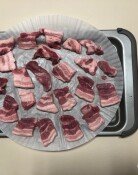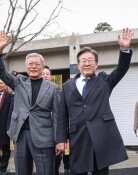Finished products from Kaesong complex piled up in dust
Finished products from Kaesong complex piled up in dust
Posted July. 24, 2013 07:26,
I managed to go back to the (Kaesong Industrial) complex and brought materials and finished goods back. But the situation is getting even worse as clients do not buy them. Now I have to spend money for warehousing.
Lee Eun-haeng, owner of Ilsung Leports, a textile company in the Kaesong Industrial Complex, brought 1,500 pieces of outdoor wear from the complex on July 15 and 16. Though the peak sales season passed, he hoped that he could make money for his employees salary by selling them at a discount. But the clients did not take them. Being so disappointed, he gave up bringing more materials and finished goods left in the complex.
Numerous companies in the Kaesong Industrial Complex brought truckloads of goods, but as buyers refused to buy them, loads of goods are now in warehouses, Lee said. I had to pay labor costs for six laborers, warehousing and logistics costs to take the goods from Kaesong.
Businesses at Kaesong were able to bring back materials and finished goods for a week from July 12, the 101st day after the passage to the complex was blocked, but business owners are just sighing. Textile companies, in particular, are hit hard because their clients refuse to buy them because the season is over.
In the initial stage of the suspension of operations at Kaesong, many buyers promised, We will buy goods at the right price when the operation resumes. As the suspension was extended, however, buyers who could not sell spring and summer goods began to turn their back.
A textile company at Kaesong said seven buyers refused to purchase their goods worth three billion won (2.6 million US dollars), which are now stored in a warehouse. The owner said, I took out as many goods as I could, believing buyers who said they would buy goods depending on their conditions. But they rejected me and now Im frustrated. Another business owner said, It cost me more than 20 million won (17,900 dollars) every month to rent a warehouse near the Dorasan station including logistics costs and a contract price for an outsourcing company to finish products in the South. I had managed to survive because I had no expense while no revenue. But after getting the products back, expenditure will be just increased.
If companies cannot sell the goods that they brought from Kaesong, theres no way for them to generate revenue until April next year when they can be paid for spring and summer goods even if the operation of the complex is back to normal. Few companies are expected to survive by then, said Han Jae-gwon, a joint chairman of the Emergency Committee for the Normalization of the Kaesong Industrial Complex.







